Mercedes GLC vs Skoda Superb Combi – Which car suits you better?
Compare performance, boot capacity, efficiency and price at a glance.
Find out which car is the better choice for you – Mercedes GLC or Skoda Superb Combi?
Costs and Efficiency:
Price and efficiency are often the first things buyers look at. Here it becomes clear which model has the long-term edge – whether at the pump, the plug, or in purchase price.
Skoda Superb Combi has a clearly advantage in terms of price – it starts at 35200 £, while the Mercedes GLC costs 50300 £. That’s a price difference of around 15099 £.
Fuel consumption also shows a difference: Skoda Superb Combi manages with 0.40 L and is therefore clearly more efficient than the Mercedes GLC with 1.60 L. The difference is about 1.20 L per 100 km.
As for range, the Skoda Superb Combi performs hardly perceptible better – achieving up to 134 km, about 6 km more than the Mercedes GLC.
Engine and Performance:
Under the bonnet, it becomes clear which model is tuned for sportiness and which one takes the lead when you hit the accelerator.
When it comes to engine power, the Mercedes GLC has a clearly edge – offering 680 HP compared to 265 HP. That’s roughly 415 HP more horsepower.
In acceleration from 0 to 100 km/h, the Mercedes GLC is significantly quicker – completing the sprint in 3.50 s, while the Skoda Superb Combi takes 5.70 s. That’s about 2.20 s faster.
In terms of top speed, the Mercedes GLC performs slight better – reaching 275 km/h, while the Skoda Superb Combi tops out at 250 km/h. The difference is around 25 km/h.
There’s also a difference in torque: Mercedes GLC pulls convincingly stronger with 1020 Nm compared to 400 Nm. That’s about 620 Nm difference.
Space and Everyday Use:
Whether family car or daily driver – which one offers more room, flexibility and comfort?
Both vehicles offer seating for 5 people.
In curb weight, Skoda Superb Combi is evident lighter – 1575 kg compared to 1910 kg. The difference is around 335 kg.
In terms of boot space, the Skoda Superb Combi offers to a small extent more room – 690 L compared to 620 L. That’s a difference of about 70 L.
In maximum load capacity, the Skoda Superb Combi performs to a small extent better – up to 1920 L, which is about 240 L more than the Mercedes GLC.
When it comes to payload, Mercedes GLC barely noticeable takes the win – 600 kg compared to 584 kg. That’s a difference of about 16 kg.
Who wins the race?
The Skoda Superb Combi proves to be outperforms in nearly all aspects and therefore becomes our DriveDuel Champion!
Skoda Superb Combi is the better all-rounder in this comparison.
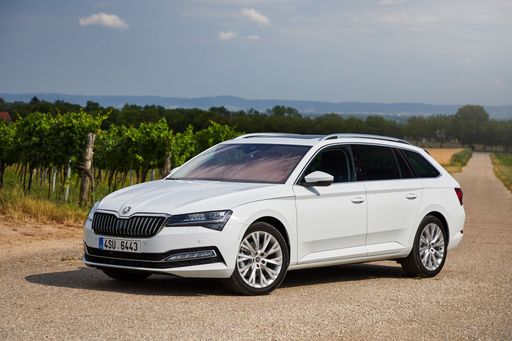
Skoda Superb Combi
Mercedes GLC
The Mercedes-Benz GLC exudes a refined elegance combined with a dynamic and sporty character, making it a standout in the SUV segment. It effortlessly blends luxury with practicality, offering a spacious interior fitted with high-quality materials and advanced technology features. The driving experience is both smooth and responsive, delivering a comfortable ride whether navigating city streets or embarking on longer journeys.
details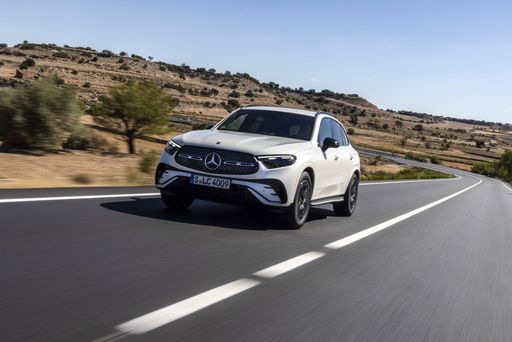 @ group-media.mercedes-benz.com
@ group-media.mercedes-benz.com
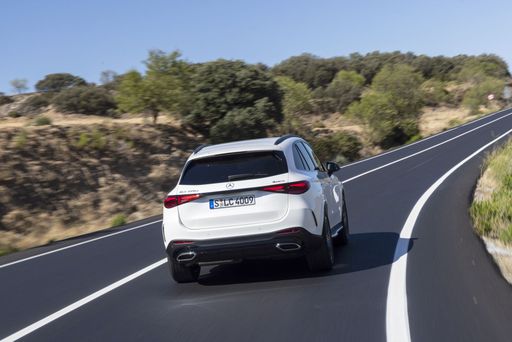 @ group-media.mercedes-benz.com
@ group-media.mercedes-benz.com
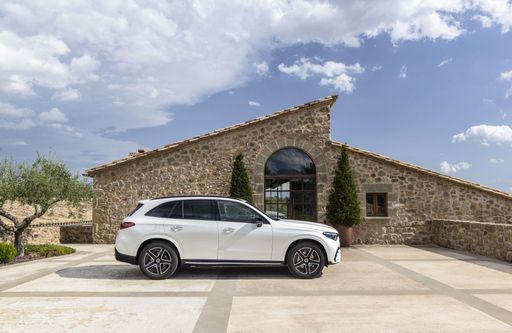 @ group-media.mercedes-benz.com
@ group-media.mercedes-benz.com
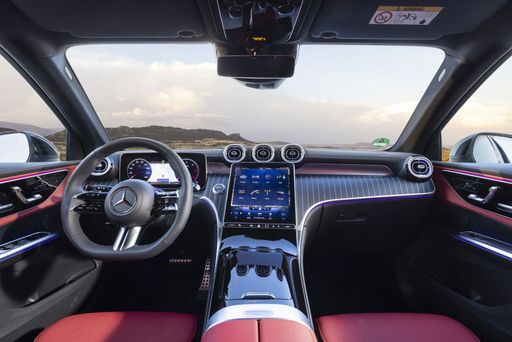 @ group-media.mercedes-benz.com
@ group-media.mercedes-benz.com
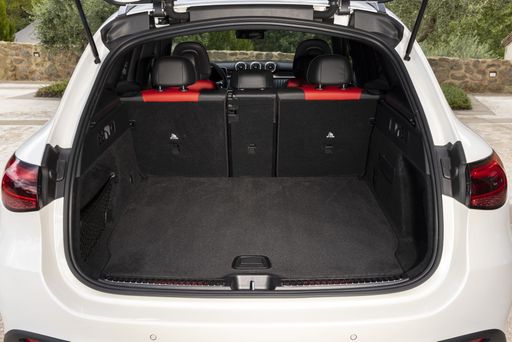 @ group-media.mercedes-benz.com
@ group-media.mercedes-benz.com
Skoda Superb Combi
The Škoda Superb Combi combines practicality and elegance, making it a popular choice for families and professionals alike. Its spacious interior offers exceptional comfort and ample storage, suitable for long journeys and everyday errands. Additionally, the refined design and advanced technology features ensure a sophisticated driving experience.
details @ Skoda Presse Deutschland
@ Skoda Presse Deutschland
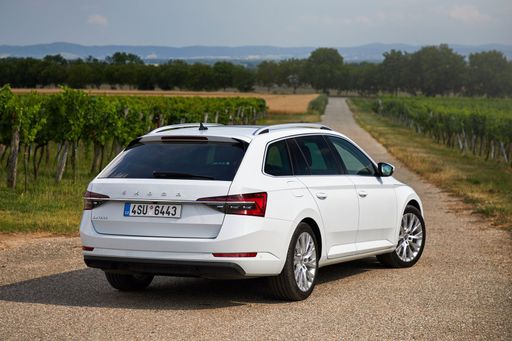 @ Skoda Presse Deutschland
@ Skoda Presse Deutschland

|

|
|
|
|
Costs and Consumption |
|
|---|---|
|
Price
50300 - 126600 £
|
Price
35200 - 51000 £
|
|
Consumption L/100km
1.6 - 9.9 L
|
Consumption L/100km
0.4 - 7.8 L
|
|
Consumption kWh/100km
-
|
Consumption kWh/100km
-
|
|
Electric Range
12 - 128 km
|
Electric Range
124 - 134 km
|
|
Battery Capacity
-
|
Battery Capacity
19.70 kWh
|
|
co2
41 - 225 g/km
|
co2
8 - 178 g/km
|
|
Fuel tank capacity
49 - 65 L
|
Fuel tank capacity
45 - 66 L
|
Dimensions and Body |
|
|---|---|
|
Body Type
SUV
|
Body Type
Estate
|
|
Seats
5
|
Seats
5
|
|
Doors
5
|
Doors
5
|
|
Curb weight
1910 - 2400 kg
|
Curb weight
1575 - 1853 kg
|
|
Trunk capacity
390 - 620 L
|
Trunk capacity
510 - 690 L
|
|
Length
4716 - 4792 mm
|
Length
4902 mm
|
|
Width
1890 mm
|
Width
1849 mm
|
|
Height
1603 - 1647 mm
|
Height
1482 mm
|
|
Max trunk capacity
1335 - 1680 L
|
Max trunk capacity
1770 - 1920 L
|
|
Payload
475 - 600 kg
|
Payload
497 - 584 kg
|
Engine and Performance |
|
|---|---|
|
Engine Type
Petrol MHEV, Plugin Hybrid, Diesel MHEV
|
Engine Type
Plugin Hybrid, Petrol, Petrol MHEV, Diesel
|
|
Transmission
Automatic
|
Transmission
Automatic
|
|
Transmission Detail
Automatic Gearbox
|
Transmission Detail
Dual-Clutch Automatic
|
|
Drive Type
All-Wheel Drive
|
Drive Type
Front-Wheel Drive, All-Wheel Drive
|
|
Power HP
186 - 680 HP
|
Power HP
150 - 265 HP
|
|
Acceleration 0-100km/h
3.5 - 9 s
|
Acceleration 0-100km/h
5.7 - 9.3 s
|
|
Max Speed
208 - 275 km/h
|
Max Speed
220 - 250 km/h
|
|
Torque
320 - 1020 Nm
|
Torque
250 - 400 Nm
|
|
Number of Cylinders
4 - 6
|
Number of Cylinders
4
|
|
Power kW
137 - 500 kW
|
Power kW
110 - 195 kW
|
|
Engine capacity
1991 - 2989 cm3
|
Engine capacity
1498 - 1984 cm3
|
General |
|
|---|---|
|
Model Year
2025
|
Model Year
2024 - 2025
|
|
CO2 Efficiency Class
F, G, B
|
CO2 Efficiency Class
B, E, F, D, G
|
|
Brand
Mercedes-Benz
|
Brand
Skoda
|
What drive types are available for the Mercedes GLC?
The Mercedes GLC is offered with All-Wheel Drive.
The prices and data displayed are estimates based on German list prices and may vary by country. This information is not legally binding.
